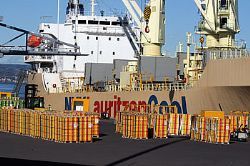China: Land of opportunity (and risk)
Two Auckland design companies have different views on China. Mike Booker explores this difference in attitude and explains how research helps companies overcome the ‘unknowns’.
gardyneHOLT has big plans in China. The Auckland design company will soon open an office in Shanghai and others may follow. Fellow Auckland design company Visual Newmedia, though also internationally ambitious, has no plans in China. It regards China as an unknown and will, initially at least, stick with more traditional markets such as Australia, the UK and the US. These opposite outlooks on China collided when Mike Holt, gardyneHOLT’s managing director, bumped into Visual’s CEO Damian McDonald and they started talking about China. Holt’s a China enthusiast. He studied Chinese philosophy at university and has recently made three visits to China to research his company’s expansion into that market. “China’s not a land of mystery to me,” says Holt. “My question is – why wouldn’t you get into China?” He has spent time in Japan and Korea and sees China following a similar economic trajectory to these two countries. Greater demand for design is part of that growth arc. McDonald is more circumspect. He says his company is going to countries it understands. “China’s just too hard. What’s the copyright situation? How do we establish trust and relationships we need? How do we deal with the amount of time needed and our unawareness of how the market works? “There are a lot of ‘don’t knows’.” Aaron Marsich of thelab, a Shanghai-based ‘ConfuciusSays’ research and insight unit, confronts these concerns everyday. He says other worries of Kiwi companies looking at China include Chinese government red tape, corruption, language and culture adjustments and getting paid. “A lot also feel that good, stable and trustworthy local business partners are hard to find.” gardyneHOLT hired thelab, and another China-based Kiwi company Redfern Associates, to help it get on top of some of these issues. Using in-market experts helped prevent a situation confronting many companies starting to look seriously at China – too much information. The danger of checking out business prospects in China sitting at a desk in New Zealand is unleashing a torrent of advice, data, facts and urban legends. A lot of the easily available information is contradictory, confusing, irrelevant, out of date, incomplete or just plain wrong. In the end it can be harder to make any decisions. Holt has some pretty straightforward advice about companies in this situation. “Just get on a goddamn plane.” Going to China early on is a good way to prevent a brain explosion. “You have just got to spend time in the place,” Holt says. “Hook into the Kiwi community there; try to get as many lunches with these people as you can; go to the drinkies.” A common piece of advice is to evaluate all you read and hear on the basis of who said it, when they said it and what part of China is being referred to. Bouncing ideas around over a beer gives a feel for China that will help make this evaluation easier, saving a lot of time and probably grief later when a company decides to commit to China. These exploratory visits will also give another key piece of information – how you feel about spending a lot of time in a market which is, to many Kiwis, inconceivably larger, faster and more complex than what they’re used to at home. “If you are going to do business in a country, start out by liking it,” says Holt. “It’ll only cost you the price of an airfare and a week in a hotel.” Actually, make that at least a couple of airfares and weeks worth of hotel bills. It’s on second, third, and fourth visits to China when research efforts really hit pay dirt. “People who can help you see lots of visitors who come through once,” says Holt. “When they start seeing you a number of times, it means you get a lot more respect from the people in China.” They’ll see you are committed and will start to really open up. “Then you can start to drill down further and when you come back to New Zealand you can decide if you want to go further.” Expat support Scott Brown, the Kiwi founder of Redfern Associates based in Shanghai and Hong Kong, says there’s a small Kiwi expat community that’s been in China ten to 15 years and “that’s as strong as any other nationality”. “I think by nature, being expats, you like helping people come in because you want more Kiwis here anyway,” says Brown. “And you don’t want to see them make the mistakes that you’ve seen others make.” He advises companies thinking of entering China to reach out to the expat community. “Go in through New Zealand Trade and Enterprise, go in through KEA, the consulates – they are great ways of doing that.” A lot of the expat guidance, given over a beer and a Beijing Kaoya (Peking duck), will be general stuff on the nature of the Chinese market, its rules and regulations and its business culture. To get a more tailored and fuller picture of China, and again avoid information overload – though not getting on a plane at some stage – companies need to hire specialist advice in China. The in-market pros are skeptical of the merits of non-China based researchers because the market is so different from any other in the world and is changing so quickly. “A lot of the information on China is very contradictory so you need somebody with experience in China to give you that information in context,” says Brown. “If you get that context, it’ll fall into place.” There’s also a shortage of public information – from searchable databases through to how to comply with rules and regulations – which pushes companies towards using local experts. gardyneHOLT plans to offer design services to foreign companies in China and used Redfern to get an understanding of potential clients, including where best to locate. It used thelab to get basic information, such as finding properties, rents and staffing. The research has shown that there are a significant number of international companies in China willing to pay international rates for design work. Where many companies see risks in China, Holt sees opportunity. “You don’t need a big percentage of business available in China to prosper.” But he admits to being cautious. “My end goal is wild, not my start up.” Mike Booker is a Wellington-based business writer. Email [email protected]





